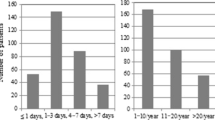Abstract
Familial Mediterranean fever (FMF) is the most frequent hereditary inflammatory disease. FMF causes different clinical manifestations in different ethnic groups and countries. In this study, we retrospectively reviewed the records of 1,152 FMF suspected patients (673 female and 479 male) from November 2006 to December 2010. A commercial kit assay for the identification of MEFV (Mediterranean fever) gene mutations based on PCR and reverse-hybridization was used to investigate 12 mutations of the MEFV gene. 52.17% of 1,152 FMF suspected patients had MEFV mutation and 45.25% of them were male. The rate of MEFV mutation among male and female patients were 56.78 and 48.88%, respectively. These results were statistically significant and might support the suggestion that FMF had much more penetrance in male patients (P = 0.009). Not any significant difference was observed between the male and female patients in terms of heterozygote and homozygote mutation carriage rate (P = 0.071). Also not any significant difference was observed between the male and female patients in terms of compound heterozygote mutation carriage rate (P = 0.058).
Similar content being viewed by others
References
Ben-Chetrit E, Touitou İ (2009) Familial Mediterranean fever in the world. Arthritis Rheum 61(10):1447–1453
Yilmaz E, Ozen S, Balcı B, Duzova A, Topaloglu R, Besbas N, Saatci U, Bakkaloglu A, Ozguc M (2001) Mutation frequency of familial Mediterranean fever and evidence for a high carrier rate in the Turkish population. Eur J Hum Genet 9:553–555
Onen F (2006) Familial Mediterranean fever. Rheumatol Int 26:489–496
Ureten K, Gönülalan G, Akbal E, Güneş F, Akyürek Ö, Ozbek M, Oztürk AM (2010) Demographic, clinical and mutational characteristics of Turkish familial Mediterranean fever patients: results of a single center in Central Anatolia. Rheumatol Int 30:911–915
Cosan F, Ustek D, Oku B, Duymaz-Tozkir J, Cakiris A, Abaci N, Ocal L, Aral O, Gül A (2010) Association of familial Mediterranean fever-related MEFV variations with ankylosing spondylitis. Arthritis Rheum 62(11):3232–3236
Celik S, Erikci AA, Tunca Y, Sayan O, Terekeci HM, Umur EE, Torun D, Tangi F, Top C, Oktenli C (2010) The rate of MEFV gene mutations in hematolymphoid neoplasms. Int J Immunogenet 37(5):387–391
Eisenberg S, Aksentıjevich I, Deng Z, Kastner D, Matzner Y (1998) Diagnosis of familial Mediterranean fever by a molecular genetic method. Ann Intern Med 129:539–542
Ben-Chetrit E, Shoval-Urieli S, Calko S, Abeliovich D, Matzner Y (2002) Molecular diagnosis of FMF: lessons from a study of 446 unrelated individuals. Clin Exp Rheumatol 20(26):25–29
Ozdemir O, Sezgin I, Kurtulgan KH et al (2011) Prevalence of known mutations in the MEFV gene in a population screening with high rate of carriers. Mol Biol Rep 38:3195–3200. doi:10.1007/s1103301099917
Dundar M, Emiroğulları FE, Aslihan Kiraz, Taheri S, Baskol M (2011) Common familial Mediterranean fever gene mutations in a Turkish cohort. Mol Bio Rep 38:5065–5069. doi:10.1007/s11033-010-0652-7
Akin H, Onay H, Turker E, Cogulu O, Ozkinay F (2010) MEFV mutations in patients with familial Mediterranean fever from the Aegean region of Turkey. Mol Bio Rep 37:93–98. doi:10.1007/s11033-009-9543-1
Touitou İ (2001) The spectrum of Familial Mediterranean Fever (FMF) mutations. Eur J Hum Genet 9:473–483
Yalcinkaya F, Cakar N, Misirlioglu M et al (2000) Genotype–phenotype correlation in a large group of Turkish patients with familial Mediterranean fever: evidence for mutation-independent amyloidosis. Rheumatology 39:67–72
Sayarlıoglu M, Cefle A, Inanç M et al (2005) Characteristics of patients with adult-onset familial Mediterranean in Turkey: analysis of 401 cases. Int J Clin Pract 2:202–205
Dusunsel R, Dursun I, Gündüz Z, Poyrazoğlu HM, Gürgöze KM, Dundar M (2008) Genotype–phenotype correlation in children with familial Mediterranean fever in a Turkish population. Pediatr Int 50:208–212
Bakarat MH, Karnick AM, Majeed HWA, El-Sobki NI, Fenech FF (1986) Familial Mediterranean fever recurrent hereditary polyserositis in Arabs: a study of 175 patients and review of the literature. Q J Med 60:837–847
Rogers D, Shohat M, Peterson GM et al (1989) Familial Mediterranean fever in Armenians. Am J Hum Genet 34:168–172
Author information
Authors and Affiliations
Corresponding author
Rights and permissions
About this article
Cite this article
Doğan, H.O., Koca, Y., Erden, G. et al. Evaluating MEFV mutation frequency in Turkish familial Mediterranean fever suspected patients and gender correlation: a retrospective study. Mol Biol Rep 39, 6193–6196 (2012). https://doi.org/10.1007/s11033-011-1437-3
Received:
Accepted:
Published:
Issue Date:
DOI: https://doi.org/10.1007/s11033-011-1437-3




